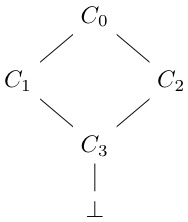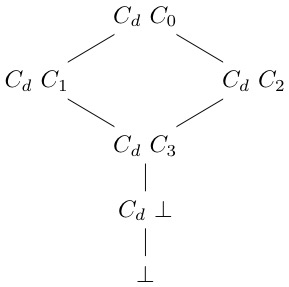using newtype and coerce
郗昀彥
Thursday
Who?
郗(ㄔ)昀彥
- jaiyalas



- https://www.github.com/jaiyalas

- functional programming language
- type theory and system
- program derivation and construction
Prelude
Irrefutable
- Patterns that never fail to match
are said to be irrefutable.
base case
- wild pattern
case v of _ -> comp
- single variable
case v of a -> comp
lazy pattern
case v of ~pat -> compcase [] of {(x:xs) -> 42}Error: Non-exhaustive patterns in case
case [] of {~(x:xs) -> 42}Value: 42
case [] of {~(x:xs) -> x}Error: Irrefutable pattern failed for pattern (x : xs)
as pattern
case v of a@pat -> compPattern a@pat is irrefutable if pat is.
case [] of {a@ (x:xs) -> a}Error: Non-exhaustive patterns in case
case [] of {a@ ~(x:xs) -> a}Value: []
case [] of {a@ ~(x:xs) -> x}Error: Irrefutable pattern failed for pattern (x : xs)
The newtype
data
Algebraic Datatype Declarations
data D a b = C1 a b
| C2 b b
| C3newtype
Datatype Renamings
newtype N0 = Cn0 Bool
newtype N1 a = Cn1 [Int]- 1 constructor, 1 parameter (field)
- wrapper
comparison
Given a data structure
data D = C0 | C1 | C2 | C3
using data..
data W = Cd D
using newtype..
newtype N = Cn D
newtype constructor is unlifted
experiment
case (Cd ⊥) of (Cd a) -> 42 => 42case ⊥ of (Cd a) -> 42 => ⊥case (Cn ⊥) of (Cn a) -> 42 => 42case ⊥ of (Cn a) -> 42 => 42
wait a sec, how is the last one not a ⊥?
Irrefutable pattern
The last way to construct one
case v of N pat -> compPattern N pat is irrefutable if pat is.
how?
case ⊥ of (N pat) -> e
=> case ⊥ of pat -> ecase (N v) of (N pat) -> e
=> case v of pat -> e- introduces a new type whose representation
is the same as an existing type- may require no run-time overhead
- must be explicitly coerced from or to the original type
- constructor
- constructor in pattern / record
- the new type is called wrapper
- no default instances
Example
Monoid
class Monoid a where
mempty :: a
mappend :: a -> a -> aBool as a Monoid
Which definition of mappend we want?
and, or, xor, .. ?
newtype All = All { getAll :: Bool }
instance Monoid All where
mempty = All True
All x `mappend` All y = All (x && y)newtype Any = Any { getAny :: Bool }
instance Monoid Any where
mempty = Any False
Any x `mappend` Any y = Any (x || y)The Shortcomings
Given
newtype HTML = MkHTML String- may require no run-time overhead
trans :: [HTML] -> [String]
- no any instances
- some can be generated by
deriving - some cannot: e.g. Functor
may require no run-time overhead
Slow!
trans :: [HTML] -> [String]
trans [] = []
trans (MkHTML s:xs) = x:(trans xs)Coerce!
- Unsafe.Corece
unsafeCoerce :: a -> b
- Data.Corece
coerce :: Coercible * a b => a -> b
Fast!
trans' :: [HTML] -> [String]
trans' = unsafeCoerce
trans'' :: [HTML] -> [String]
trans'' = coerceGiven
data D = C ...
newtype N = MkN Dand F is a type-level function,
- Haskell(GHC) do knows
N=D
- Haskell(GHC) don't knows
F N=F D
unsafeCoerce: force F N = F D
coerce: Coercible (F N) (F D) then F N = F D
how do we (or GHC) know (F N) and (F D)
are coercible?
No default instances
Sure we can
deriving ( Eq
, Ord
, Read
, Show
, Bounded
, Generic)Is this ok?
deriving Functor- -XGeneralizedNewtypeDeriving
- inherit instances
newtype Age = MkAge Int deriving Num
newtype Ls a = L [a] deriving Functor- -XGeneralizedNewtypeDeriving
- inherit instances
coerce :: Coercible * a b => a -> b
how do we (or GHC) know (F N) and (F D)
are coercible?
Roles
Having roles assigned to type variables of datatypes, classes, and type synonyms.
- phantom
- representational
- nominal
phantom role
This a has role phantom
data Phant a = MkPhant Bool For any t1 and t2, GHC automatically has
instance Coercible (Phant t1) (Phant t2)representational role
This a has role representational
data Simple a = MkSimple aIf t1 representationally equals to and t2, then
instance Coercible (Simple t1) (Simple t2)nominal role
This a has role nominal
data Complex a = MkComplex (F a)If
F t1 = u1,F t2 = u2,u1 = u2(identical); then
instance Coercible (Complex t1) (Complex t2)newtype Age = MkAge Int
type role Cr representational
data Cr a = MkCr a
type role Cn nominal
data Cn a = MkCn a (coerce :: Cr Age -> Cr Int) (MkCr $ MkAge 1)
=> MkCr 1
(coerce :: Cn Age -> Cn Int) (MkCn $ MkAge 1)
=> Couldn't match type ‘Age’ with ‘Int’- -XRoleAnnotations